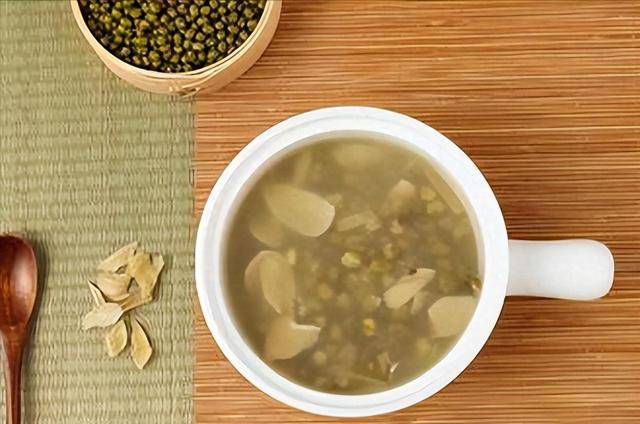Before reading this article, we invite you to click “Follow” to receive professional medical popular science knowledge every day, helping you and your family improve the quality of healthy living. Thank you for your support!
Many people have heard the saying, “If you have poor digestion, you shouldn’t eat mung beans.” Is this true? In fact, diet is crucial for digestive health. Choosing the right foods and correct eating methods can help improve our digestive condition. Today, let’s explore whether people with poor digestion can eat mung beans and what other coarse grains can help maintain our digestive system.
Nature of Mung Beans
Mung beans are cold-natured food, which many people are aware of. They are rich in proteins, dietary fiber, and various vitamins and minerals, offering many benefits to the body. Due to their cold-natured property, some individuals with weaker digestive functions may feel discomfort after consuming mung beans, which has led to the unfavorable reputation of mung beans.
Benefits of Moderate Consumption
Moderate consumption of mung beans still has its benefits. Mung beans can help in clearing heat, detoxification, and relieving heat-related conditions. For individuals with normal digestive functions, consuming mung bean soup in the summer can not only clear heat and reduce fire but also provide nutritional benefits. The key is to control the amount consumed, avoiding excessive intake, especially for individuals with sensitive digestive systems.
Not Suitable for Certain Individuals
Indeed, some digestive issues make it unsuitable to consume mung beans. For example, patients with ulcers or severe gastritis should avoid mung beans to prevent worsening of their conditions. These individuals can opt for other gentle alternative foods such as red bean soup or warm grains porridge, which can nurture the stomach without causing irritation.
Oatmeal
Oatmeal is a suitable coarse grain for individuals with poor digestion. It is rich in soluble fiber, especially beta-glucan, which promotes intestinal peristalsis, increases fecal volume, and facilitates smooth bowel movements. For those trying oatmeal for the first time, starting with small amounts and gradually increasing intake allows the digestive system to adjust. Mixing oatmeal flakes with milk or yogurt not only enhances taste but also benefits the digestive system.
Brown Rice
Brown rice retains the bran and germ layers, containing dietary fiber and various micronutrients that contribute to maintaining digestive health. Brown rice is tough and less digestible, so it is recommended to soak it before consumption or cook it as porridge mixed with white rice to maintain nutrition and aid digestion. Brown rice porridge is a great choice for individuals with poor digestion.
Millet
Millet is widely consumed in northern China and is known for its reputation of “beneficial to the spleen and stomach.” Millet is rich in various vitamins and minerals that protect the gastric mucosa. Millet porridge is easily digestible and provides rich nutrition, making it particularly suitable for the elderly and children. Drinking a bowl of millet porridge daily can have positive effects on stomach health.
Digestive Health Tips
In addition to choosing appropriate foods, maintaining dietary regularity is essential for digestive health. It is recommended to eat smaller meals more frequently, avoiding overeating, to relieve the burden on the digestive system and promote digestion. Taking a short rest after meals instead of lying down immediately helps improve food digestion and absorption. Adequate water intake is necessary, but consuming large amounts of water immediately after meals should be avoided to prevent dilution of gastric juices, which can affect digestive functions.
Proper Nutrition
A balanced diet structure is crucial for digestive health. Eating a balanced diet in moderate portions and avoiding overindulgence can effectively protect the digestive system. Limiting consumption of spicy foods reduces stimulation to the gastrointestinal mucosa and is an important measure for digestive health. Consuming more vegetables, fruits, and whole grains ensures comprehensive nutrient intake.
Healthy Lifestyle Habits
In addition to diet, good lifestyle habits are essential for digestive health. Eating meals at regular times and in moderate amounts every day helps maintain a regular eating routine. Avoiding lying down immediately after meals allows adequate time for the gastrointestinal tract to digest food. Engaging in moderate exercise, such as taking a walk after meals, promotes digestion and enhances physical fitness.
Oatmeal, brown rice, and millet are three beneficial coarse grains for digestive health. Moderate consumption promotes digestion and protects the gastric mucosa. Moderate consumption of mung beans is not entirely unsuitable for individuals with poor digestion; the key lies in controlling the method and amount of consumption. We hope everyone can scientifically maintain their digestive health, prevent diseases, and lead a healthier and happier life.
Finally, do you have any experiences or opinions to share? Feel free to leave a comment in the comments section!


